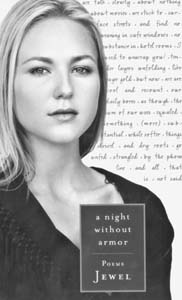Jewel In the Rough
from the cover of 'A Night Without Armor '
Modern-day folk muse Jewel opens another page in her life's book with a guileless collection of poetry
By Sarah Quelland
GRAMMY-NOMINATED singer-songwriter Jewel has become somewhat of a modern-day folk-rock heroine in the tradition of Joni Mitchell. With her debut album, Pieces of You, which includes the hit songs "Who Will Save Your Soul" and "You Were Meant for Me," the flaxen-haired siren dazzled the music world with her acute blending of socio-political themes, poetic lyrics and quirky charm. Her album has spent a record- breaking 120 weeks on the Billboard charts, and Jewel has become one of the most heralded performers of the late '90s.
In addition to her multiplatinum album, the 24-year-old Homer, Alaska, native has turned poetic scribe, releasing her first collection of poetry, titled A Night Without Armor (Harper Collins). In the preface, she reflects, "I've learned that not all poetry lends itself to music--some thoughts are meant to be sung only against the silence." This sentiment was suggested in the liner notes on Pieces of You, which include several of her shorter self-penned poems. But the 138-page A Night Without Armor grants her an even greater freedom of expression.
What's striking about Jewel's book of poetry is its candor. Her words create stark portraits of people and places. More a journal than a deliberately crafted book of poems, A Night Without Armor is a biography of sorts, and it seems clear that these poems were lovingly lifted, probably unchanged, from journals Jewel has carried with her throughout the years.
She takes her readers through a tour of the grimy city streets, busy airports, lonely hotel rooms and other sundry places that inspired her to write. While Jewel's not a polished performer or writer, her natural imperfections are her greatest appeal. Some may criticize her poems as the work of an amateur, but it's the rough edges that make them interesting.
A Night Without Armor is an intimate work in which Jewel moves fluidly through words, sometimes quickly, sometimes lazily, to capture moments in her life. And she's willing, even eager, to share those moments.
In "Too Many Nights" she writes, "It's been/too many nights/of being with/to now be suddenly/without." In "Pretty" she writes, "There is a pretty girl/on the/Face/of the magazine/And/all I can see/are my dirty/hands/turning the page." And in "Junky" she writes, "mamma says she knows what/i'm gonna grow up to be."
These words feel immediate and untouched, and the rest of A Night Without Armor offers many similarly brief, raw insights. It also offers more substantial poetic verse that indicates her purposeful development and structuring of an idea.
Many of Jewel's poems are titled by location--"Second Thoughts in Columbus, Ohio," "In the South of England Somewhere" and "Austin, TX, Sheraton Hotel, 2am"-- spots she may have stopped during life on the road. She questions her success in "Tai Pei," writing, "I am told/I am adored by millions/but no one calls," and again in "The Strip 1," where from the streets of Las Vegas she writes, "Here I am/on the strip./The Main attraction/My name up/in lights/What's there to do, pussy cat?/(Nothingnotmuchverylittle)."
What Jewel does best is capture the ordinary occurrences that people otherwise dismiss. She lingers in these moments, contemplating their significance and harnessing them with her pen.
She reflects on her youth with "I Look At Young Girls Now," remembering a pair of vintage burgundy shorts she wore, "showing off all my lanky/leggy blossoming/youth on the verge/of womanhood for all the/free world to see/with no idea how to keep/a secret, especially my own."
In the abrasive "I'm Writing To Tell You," she tells a lover, "it has become/unbearably obvious/that you love me with/all the originality/of romance novels/ But do not be sad/nothing is lost/neither of us even loved/the other truly/you only thought you did/and I only wanted to." In another work titled "P.S." she writes "I wrote you those nice/poems only because/the honest ones/would frighten you."
Not a total cynic, Jewel reveals a bright romantic spirit as well, with "Love Poem," "So Just Kiss Me," "Gather Yourself" and "Someone to Know Me," and a racier side with "The Parking Lot."
Through more than 100 poems, Jewel expresses spirituality, tenderness, anger and delight. She reflects on her poetic heroes in "Bukowsky's [sic] Widow," celebrates her homeland ("The Slow Migration of Glaciers") and contemplates her family in "Goodness (A Poem for Shane)."
Ultimately it's her love and admiration of the art of poetry itself that fuels the book. "There is such wonderful poetry in the world that wants to be given voice," Jewel writes. "My hope is to help inspire an appreciation and expression of that voice."
In her newfound fame, Jewel has become a role model for many young women and the focus of a fan club of "Everyday Angels." By sharing her own work, she encourages others to write, and proves that poetry doesn't have to be perfect to be good--it just has to be real.
Copyright © Metro Publishing Inc. Maintained by Boulevards New Media.
![]()
 Jewel Tone: Singer-songwriter Jewel flexes her poetry-writing muscles in her reflective book of verse, 'A Night Without Armor.'
Jewel Tone: Singer-songwriter Jewel flexes her poetry-writing muscles in her reflective book of verse, 'A Night Without Armor.'
From the July 2-8, 1998 issue of Metro Santa Cruz.
![[MetroActive Books]](/books/gifs/books468.gif)